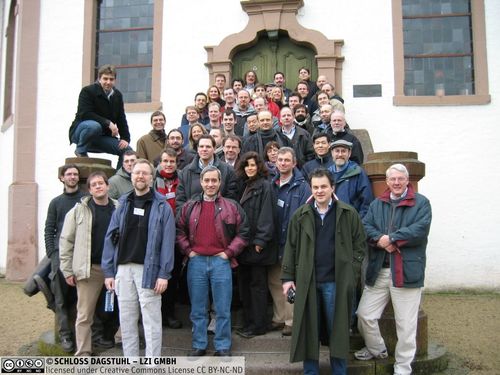Dagstuhl Seminar 05051
Probabilistic, Logical and Relational Learning – Towards a Synthesis
( Jan 30 – Feb 04, 2005 )
Permalink
Organizers
- Luc De Raedt (Universität Freiburg, DE)
- Thomas G. Dietterich (Oregon State University, US)
- Lise Getoor (University of Maryland - College Park, US)
- Stephen H. Muggleton (Imperial College London, GB)
Contact
One of the central open questions of artificial intelligence is concerned with combining expressive knowledge representation formalisms such as relational and first-order logic with principled probabilistic and statistical approaches to inference and learning. This combination is needed in order to face the challenge of real-world learning and data mining problems in which the data are complex and heterogeneous and we are interested in finding useful predictive and/or descriptive patterns.
In this context, the terms probabilistic and statistical refer to the use of probabilistic representations and reasoning mechanisms grounded in probability theory, such as Bayesian networks, hidden Markov models and probabilistic grammars and the use of statistical learning and inference techniques. Such representations have been successfully used across a wide range of applications and have resulted in a number of robust models for reasoning about uncertainty. The primary advantage of using probabilistic representations is that well-understood and principled statistical inference and learning algorithms exist.
The term learning refers to deriving the different aspects of the probabilistic model on the basis of data. Typically, one distinguishes various learning algorithms on the basis of the given data (fully or partially observable variables) or on the aspect being learned (the parameters of the probabilistic representation or the structure of the model). Statistical and Bayesian approaches provide a unified framework for learning a model, whether through model selection or explicitly modeling a distribution over the models.
The terms logical and relational refer to first order logical and relational representations such as those studied within the field of computational logic and database theory. The primary advantage of using such expressive representations is that it allows one to elegantly and naturally represent complex situations involving a variety of objects as well as relations among the objects, which is not possible using the simpler propositional or feature vector based representations. So, probabilistic, logical and relational learning aims at combining its three underlying constituents: statistical learning and probabilistic reasoning within logical or relational representations.
Seminar Goals
The goal of this seminar was to bring together the researchers interested in the area of statistical, logical and relational learning. This allowed the participants to explore the foundations, challenges and research opportunities raised by this important open problem in artificial intelligence.
Conclusion
This workshop brought together a signficant number of researchers from all over the world that are working on all aspects of probabilist, logical and relational learning. It was also the first workshop on this topic where there was sufficent time for indepth discusions, debates and working groups. It was exciting to see the progression through the week. It was clear that some common ground had been identified, yet this was just the start. There was a general feeling that the workshop was a success, and a lot of enthusiasm for a follow on workshop.
- Nicos Angelopouos (University of York, GB)
- Hendrik Blockeel (KU Leuven, BE) [dblp]
- Wray Buntine (HIIT - Helsinki, FI)
- Jianzhong Chen (Imperial College London, GB)
- James Cussens (University of York, GB) [dblp]
- Luc De Raedt (Universität Freiburg, DE) [dblp]
- Thomas G. Dietterich (Oregon State University, US) [dblp]
- Pedro Domingos (University of Washington - Seattle, US) [dblp]
- Kurt Driessens (University of Waikato, NZ)
- Saso Dzeroski (Jozef Stefan Institute - Ljubljana, SI) [dblp]
- Alan Fern (Oregon State University, US)
- Peter Flach (University of Bristol, GB) [dblp]
- Paolo Frasconi (University of Firenze, IT) [dblp]
- Johannes Fürnkranz (Darmstadt, DE) [dblp]
- Thomas Gärtner (Fraunhofer IAIS - St. Augustin, DE) [dblp]
- Lise Getoor (University of Maryland - College Park, US) [dblp]
- Robert Givan (Purdue University - West Lafayette, US)
- Elias Gyftodimos (University of Bristol, GB)
- Robert Holte (University of Alberta - Edmonton, CA)
- Manfred Jaeger (Aalborg University, DK) [dblp]
- David Jensen (University of Massachusetts - Amherst, US)
- Gabriele Kern-Isberner (TU Dortmund, DE) [dblp]
- Kristian Kersting (Universität Freiburg, DE) [dblp]
- Roni Khardon (Tufts University - Medford, US) [dblp]
- Joost Kok (Leiden University, NL) [dblp]
- Rudolf Kruse (Universität Magdeburg, DE)
- Nicolas Lachiche (University of Strasbourg, FR)
- Codrina Lauth (Fraunhofer Institut FIT - St. Augustin, DE)
- John W. Lloyd (Australian National University, AU)
- Donato Malerba (University of Bari, IT)
- Heikki Mannila (University of Helsinki, FI) [dblp]
- David McAllester (TTIC - Chicago, US)
- Brian Milch (Univ. California - Berkeley, US)
- Raymond Mooney (University of Texas - Austin, US) [dblp]
- Stephen H. Muggleton (Imperial College London, GB) [dblp]
- Jennifer Neville (University of Massachusetts - Amherst, US) [dblp]
- C. David Page (University of Wisconsin - Madison, US)
- Andrea Passerini (University of Florence, IT) [dblp]
- Hanna Pasula (MIT - Cambridge, US)
- Claudia Perlich (New York University, US)
- David Poole (University of British Columbia - Vancouver, CA) [dblp]
- Foster Provost (New York University, US) [dblp]
- Jan Ramon (KU Leuven, BE)
- Dan Roth (University of Illinois - Urbana-Champaign, US) [dblp]
- Taisuke Sato (Tokyo Institute of Technology, JP)
- Tobias Scheffer (HU Berlin, DE) [dblp]
- Mathieu Serrurier (Paul Sabatier University - Toulouse, FR)
- Arno Siebes (Utrecht University, NL) [dblp]
- Prasad Tadepalli (Oregon State University, US)
- Ben Taskar (Stanford University, US)
- Volker Tresp (Siemens AG - München, DE) [dblp]
- Martijn van Otterlo (University of Twente, NL) [dblp]
- Michael Werman (The Hebrew University of Jerusalem, IL)
- Stefan Wrobel (Fraunhofer IAIS - St. Augustin, DE) [dblp]


